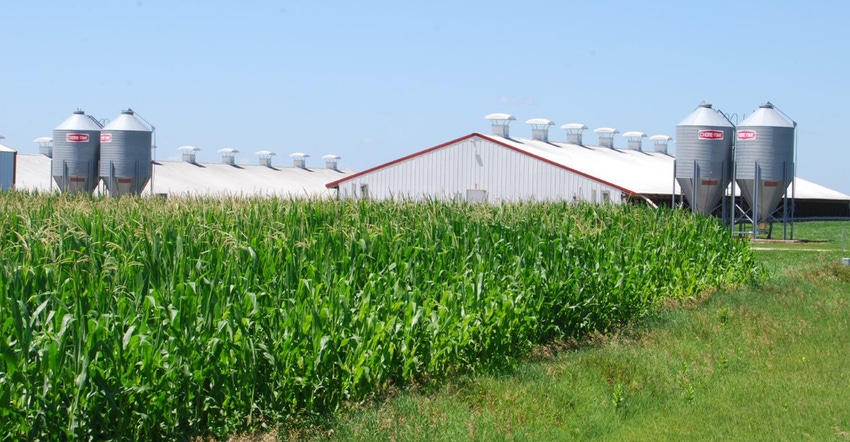June 21, 2019

We have previously reported on the well-publicized jury verdicts in 2018 in North Carolina, which awarded millions of dollars to neighbors of hog farms. Since 2018, producers in North Carolina have seen two additional verdicts finding a nuisance, and 20 more cases are set to go to trial.
Despite these outcomes in North Carolina, other juries found hog farms were not a nuisance and awarded no money to neighbors — one in 2015 in Iowa, one in 2016 in Illinois and another in 2017 in Minnesota.
Since those cases, there have been two jury verdicts in 2019 in Iowa, where juries found livestock operations not nuisances and awarded no money to the neighbors who filed suit. Here’s an update on these new verdicts and their impact on the livestock industry.
Buchanan County case earlier this year
The first case was Lympus & Fitzgerald v. Brayton & Higgins, a case that concluded on Jan. 17 in Buchanan County involving an 800-head cattle concrete open feedlot with a half-acre concrete runoff control basin. The defendants were the owners of the feedlot and the owners of the cattle under contract. Three neighbors who lived in two residences before the feedlot was built, each about 500 feet north of the feedlot, sued, alleging that odor and flies from the operation were a nuisance.
After a five-day trial, the judge ruled that Iowa animal feeding operations nuisance defense was constitutional under the factors set out in a 2018 Iowa Supreme Court ruling. However, the nuisance defense law was not needed because the jury found that the feedlot was not a nuisance and awarded no money to the three plaintiffs. The plaintiffs had submitted a claim to the jury of $600,000.
The three neighbors alleged that the odor was unbelievable and obscene — a heavy, wet smelling ammonia type odor — and that the odor and flies prevented them from enjoying their property. However, four tenants who lived in a house at the feedlot at various times, as well as a mail carrier who delivered to all three residences, testified that the while the odor was strong at times, it was not very often, and the odor and flies were normal for the country. Interestingly, one of the tenants even had her wedding in the backyard.
Henry County case won by producers
The next case was a three-week trial involving hogs that ended on Feb. 20, with a Henry County jury finding that three 4,992-head swine deep-pit finishers were not a nuisance. The case was Lappe, Bergthold & Sternat v. AWP Pork LLC, Solar Feeders LLC, Bill Huber & Kansas-Smith Farms LLC.
Solar Feeders owned the hog barns and leased them to AWP Pork, which then subleased to Kansas-Smith Farms. The six neighbors who sued lived there before the hog barns were built in three residences that were 1 mile, 1.5 miles and 1.66 miles from the closest of the three hog farms.
The neighbors alleged at trial that the odor gave them headaches, burned their eyes and nose, made them gag and cough, was nauseating, took their breath away, and made them congested, among other things. These neighbors also testified that after the hog barns were built, they had terrible flies and increased mice on their properties.
The jury then heard from two neighbors not in the lawsuit who lived about one-half mile from the hog barns, closer than any of those who sued. These neighbors also lived on their properties before the hog barns were built. Each testified there was odor, but that it did not affect their normal activities. One testified that his wife and high school daughter liked to run, and they ran directly by the hog barns. He was also a mail carrier, and he testified he did not notice odor or flies while delivering mail to two of the plaintiffs’ residences.
The jury also heard testimony from the pork producers that they consulted with the Coalition to Support Iowa’s Farmers before siting the barns. The jury also heard from the defendants’ expert witnesses, including a swine management expert, a livestock entomologist and a property appraiser.
After hearing the trial testimony and the plaintiffs’ request for a total of $1.5 million, the jury found no nuisance and awarded no money to the six plaintiffs.
Des Moines County case voluntarily dismissed
Following the jury verdict in this Henry County case, a related pending case in Des Moines County — Lappe, v. AWP Pork, LLC, Kansas-Smith Farms, LLC, Russell Yoder, Tim Graber, Pork R Russ, LLC, and Graber Hog Farms, LLC — was voluntarily dismissed by the plaintiffs on April 24.
At least in Iowa and in some surrounding states, these jury verdicts show that if producers meet, and if reasonably possible exceed, all applicable environmental regulations and use industry-accepted management practices (reasonable for their individual operations), they will likely not be sued. And if they are, they should qualify for Iowa nuisance defense protections, and there is a good chance that juries will properly evaluate that evidence despite claims of neighbors opposed to their operations.
Special thanks for collaboration and information from the Iowa Pork Producers and my law partners at Brick Gentry, Eldon McAfee and Julie Vyskocil, on this article.
Herbold-Swalwell is an attorney with Brick-Gentry in Des Moines. Email [email protected].
About the Author(s)
You May Also Like






